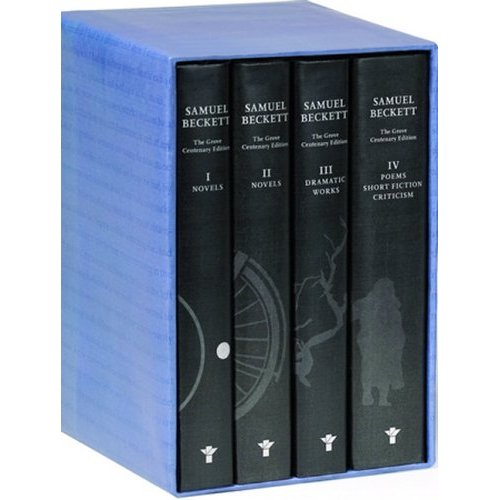
So far as I can tell, there's no European equivalent to Grove Press's 4-volume Centenary Edition of Samuel Beckett's works (published last year, & which I have been carrying about, reading thru, & generally caressing ever since I received my copy for Christmas). No Pleiade Beckett in French, as one might expect, nor has Calder, his English publisher, issued a set analogous or identical to Grove's American enterprise.
Mind you, this is a lovely edition. It brings together almost everything (I'll get back to that "almost") that Beckett ever published in English, or translated into English himself. (A very few of his translations, early on, were done in collaboration with other translators, I assume before Beckett realized the aesthetic potential in the act of self-translation.) The omission of works existing only in French is quite deliberate, according to Paul Auster, the Grove Centenary Edition's (henceforward GCE's) series editor, & he concedes that this means that, however definitive it may be in presenting the works upon which Beckett's vast reputation rests, the edition "does not constitute a Collected Works."
Auster has for the most part chosen wisely in assigning superstar writers to introduce each volume: Colm Tóibín's introduction to the 1st volume of "Irish" novels is excellent; Salman Rushdie's introduction to the 2nd volume of novels – the Trilogy and How It Is – is luminous; & JM Coetze's introduction to the final volume of poetry, short fiction, & criticism is wonderfully hard-nosed & critically uncompromising. (Only Edward Albee's introduction to the Dramatic Works falls short, amounting to a page & a half of noting how really cool Beckett's plays are. Was Harold Pinter, Wole Soyinka, or Tom Stoppard otherwise occupied?)
But I fear, with my own obsessive anality coming to the fore, that I'm still dissatisfied with this edition, despite its lovely design & really wonderful typography – such an improvement over the hodge-podge of mostly dreadfully designed Grove paperbacks in my office. It's about the text, in part. The Grove website claims that "Typographical errors that remained uncorrected in the various prior Grove editions of Beckett's work have been corrected in consultation with Beckett scholars C.J. Ackerley and S E. Gontarski," but the books themselves make no note of textual matters save for the following: "Design and textual supervision by Laura Lindgren." She's done a lovely job of the design, for sure: but I'd feel much better about the texts – Watt is almost legendary for its longstanding corruption – if I'd been at least assured somewhere in the books themselves that real textual editors were on the job. (Ideally, of course, there'd be 20 or 30 pages of textual notes at the end of each volume detailing corrections & variations, but perhaps that's asking too much.)
And then there's the contents themselves: I can entirely understand the GCE's leaving out Beckett's posthumously published works, the novel Dream of Fair to Middling Women & the play Eleuthéria (which was written in French, & which SB himself didn't translate). But Auster is a trifle disingenuous when he claims that all that has been omitted from the 4 volumes are "a number of untranslated French poems and short critical essays." "Those with a knowledge of French," he continues helpfully, "can find them in Collected Poems in English and French and Disjecta, both available from Grove Press." (My inner copyeditor adds that those without a knowledge of French can find them there as well, tho they won't be able to read them.)
A glance at the contents of Disjecta, however, shows one that more than just a few French-language essays have been omitted from the GCE. (For the record, the GCE's "criticism" section consists of precisely 3 items: the Finnegans Wake essay "Dante...Bruno.Vico..Joyce," the book Proust, & the "Three Dialogues" with Georges Duthuit.) Leaving aside the Disjecta pieces in French & German, & leaving aside the various excerpts from letters, there remain almost 20 reviews & notes on writers, poets, & painters – all in English – that for some reason passed thru the GCE's editorial sieve. Reviews & notes on Mörike, on Rilke, on Ezra Pound; on such Irish modernists as Denis Devlin & Thomas McGreevy; on painters Jack B. Yeats & Avigdor Arikha. And finally, a 12-page fragment of Human Wishes, SB's play about Samuel Johnson.
I'm all in favor of honoring authors' posthumous desires about what to publish & what to leave unpublished (tho I suspect Grove's decision not to include Dream of Fair to Middling Women and Eleuthéria had more to do with the fact that they're in print from other publishers than with Beckett's wishes). But these pieces in Disjecta – written in English or translated into English by SB, published in his lifetime with his (grudging) permission – seem to meet all possible criteria for inclusion in the big 4-volume set. It would be silly to claim they're essential bits of the Beckett oeuvre, but I for one would like their exclusion to be explained a bit more clearly.
But enough grousing. Despite its teeny omissions, & despite the "black box" nature of its textual editing, this is my working Beckett from here on out: an extraordinary collection, beautifully produced & wonderfully readable to boot. Nothing like being brought face to face with the emptiness & inanity of human existence thru a nice piece of bibliographic art.
3 comments:
Mark,
Is the text of the poems based on the dreadful _Poems 1930-1989_, or are they freshly edited?
The ink from the book spines comes off on your fingers, too! That's just a little bonus. I think Sam would have approved.
I've seen two versions of the boxed set. One has a white dot on the spine and one doesn't.
Post a Comment